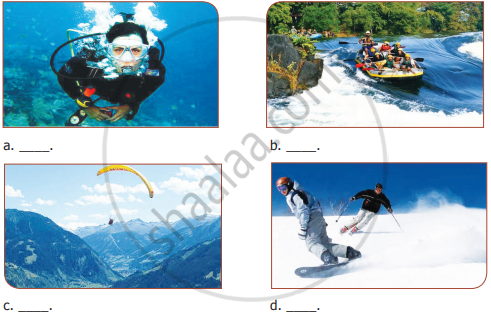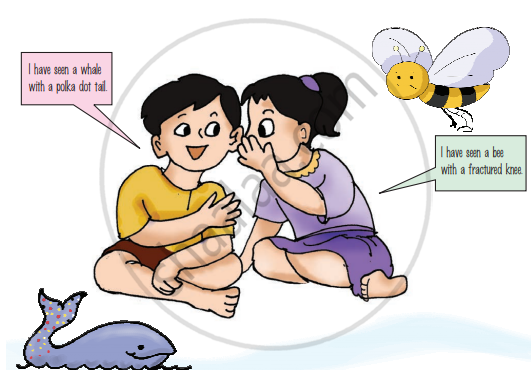Advertisements
Advertisements
Question
Let’s practice with P and F.
| pleased | pricked | pinched | punished |
| fat | fruit | fell | forgotten |
| palm | pair | proud | parade |
| farm | fare | frown | fish |
Solution
Do it yourself.
APPEARS IN
RELATED QUESTIONS
Read the poem aloud.
As the sky was cloudy, they could get the glimpse of the Mount Everest.
Her mobile phone is also a kind of ______.
Children can feel ________ when they have their mobile phones with them.
Raj understood that failures are stepping stones to ______.
Why do birds sing?
What is your friend’s hobby? How does it differ from yours? Discuss and write.
Mint leaves help to cure______.
Listen to your teacher and number the pictures accordingly.

Udagamandalam is located in the Western Ghats zone at an altitude of______.
Listen to the advertisement and answer the question given.
When does the deposit mature?
- Both
- 21 years
- 14 years
If there is no clock in the house to wake you in the morning, how will you wake up?
Will you continue to sleep or....
Whisper a secret in your partner’s ear. The partner will in turn whisper his secret in your ear.

Now talk about the secret aloud.
Listen to your favourite advertisement on the radio or T.V. Repeat it with stress on the words. Act, draw and write the advertisement.
First, read the following sets of limericks with missing words. Now, listen to them being read out aloud by your teacher or played on the recorder. As you enjoy the absurd fun, complete the verse with what you hear. You may listen to them again, if required.
I
A wonderful bird is the (i) ______His beak can hold more than his (ii) ______can. He can hold in his beak Enough food for a (iii) ______! But I’ll be darned if I know how the Peli-can?
II
There once was a (iv) ______ at the zoo Who always had something to do When it (v) ______ him, you know, To go to and fro, He (vi) ______ it and went fro and to.
III
There once was a (vii) _______ little bunny Who I thought was sweet and (viii) ______ He ate all the carrots, And looked at the (ix) ______ And that was my cute little (x) ______.
Mahesh had been to the ______Lake Wild Life Sanctuary.
Listen to the passage being read out. Based on your understanding, complete the statements given below with appropriate answers.
Boredom
We have all experienced boredom sometime or the other. Boredom occurs when a person is unable to stay attentive. It is something more than an unpleasant feeling. It can make you angry and frustrated and lead to negative physical health consequences.
How boredom affects one physically
A study reveals that when a person is affected by acute boredom his eyelids droop and the face assumes a frown. There is a gradual loss of ability to coordinate movements. These symptoms are accompanied by mental fatigue and a slowing down of thought processes. A bored person at work is likely to make many more errors than one who is not bored. We should never let boredom take charge. There are several easy ways to overcome boredom.
Here are a few practical suggestions:
- Set goals for yourself, work towards them.
- Develop an interest in hobbies and crafts.
- Socialize, stay in the company of cheerful people.
- Take up a charitable cause.
- Exercise regularly.
Coming out of boredom will feel like breaking free from a cold, dark room into the outdoors on a warm, sunny day
- Boredom occurs when a person is unable to ______
- ______ and ______ are emotional consequences of boredom.
- Two physical signs of acute boredom are
- How does boredom affect the quality of work a person does?
- Mention two ways by which one can overcome boredom.
Listen to the poem and fill in the blanks with appropriate words and phrases. If required listen to the poem again.
The World Is Too Much with Us
The world is too much with us; late and soon, Getting and spending, we lay waste our powers; Little we see in ______that is ours; We have given ______away, a sordid boon! This Sea that bares her bosom ______, ______that will be howling at all hours, And are up-gathered now like ______, For this, for everything, we are ______; It ______us not. Great God! I'd rather be A Pagan suckled in a creed outworn; So might I, standing on this pleasant lea, Have glimpses that would make me less forlorn; Have sight of Proteus rising ______Or hear old Triton blow his wreathed horn.
Listen to the poem and fill in the blanks with appropriate words and phrases. If required, listen to the poem again
Wander-thirst
BEYOND the East the sunrise, beyond the West the sea, And East and West the wander-thirst that will not let me be; It works in me like madness, dear, to bid me say good-bye; For the seas call, and the stars call, and oh! the call of the sky!
I know not where the white road runs, nor what the blue hills are; But a man can have the sun for a friend, and for his guide a star; And there’s no end of voyaging when once the voice is heard, For the rivers call, and the roads call, and oh! the call of the bird!
Yonder the long horizon lies, and there by night and day The old ships draw to home again, the young ships sail away; And come I may, but go I must, and, if men ask you why, You may put the blame on the stars and the sun and the white road and the sky.
Choose the best option and complete the sentences.
1. ______ works like madness in the poet.
- Wander – Thirst
- Bidding Farewell
- Eastern Sunrise
- Western Seas
2. A man could choose ______ as his guide.
- the sun
- the hills
- a star
- a bird
3. There is no end of ______once the voice is heard.
- walking
- roaming
- talking
- voyaging
4. The old ships return, while the young ships ______.
- drift
- move
- sail
- wander
5. The blame is on the sun, stars, the road and the ______.
- hills
- trees
- seas
- sky
Which of the following is not considered a tool for formative assessment?
